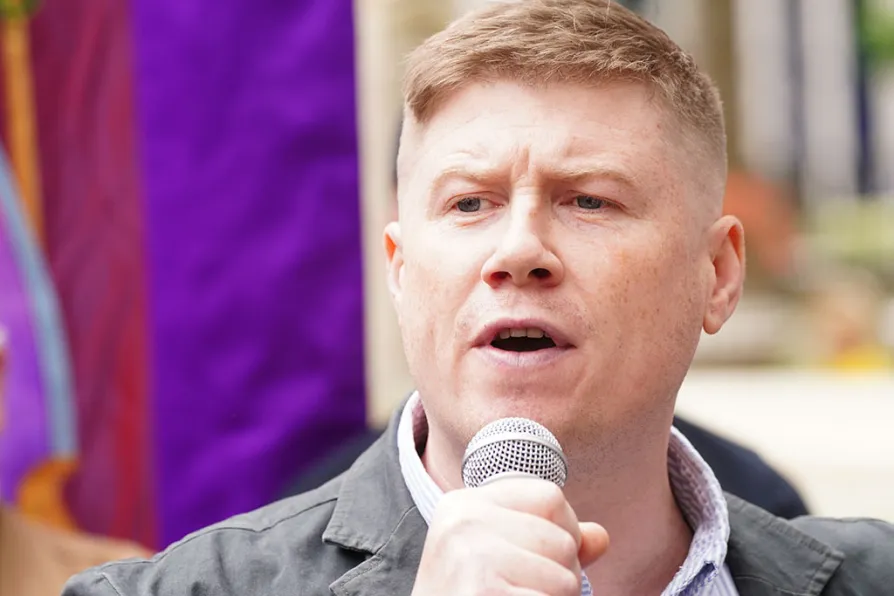The newly elected general secretary of the Aslef train drivers’ union speaks to Ben Chacko about union wins, a welcome shift in approach to the rail sector and what still needs to be done
Our members face daily abuse, being spat at, sometimes even deadly assaults, and employers fail to take the issue seriously despite the increasing danger, writes RMT general secretary EDDIE DEMPSEY

 RMT general secretary Eddie Dempsey
RMT general secretary Eddie Dempsey
AGMs are the centrepiece event in any trade union calendar. It is the parliament of our union’s democracy, and it is where our delegates collectively set RMT priorities for the next 12 months.
Top of our agenda is making sure employers across the railway deal with staff assaults. The issue has been brought into even sharper focus following the tragic death of our colleague, brother Jorge Ortega, who was killed following a deadly assault at his place of work in Ilford station last year.
Our thoughts will be with him and his family throughout our AGM.
Too many of our members are going to work in fear. They are being punched, spat at, racially abused, threatened with weapons and attacked while simply doing their jobs.
For some of our members, this can be a regular occurrence. But what is equally disturbing is the response of too many employers, who seem to think they do not need to provide adequate support, despite the increasing dangers.
Our union is clear that well-staffed stations and trains lead to a safer workplace and a greater sense of security among passengers.
We are demanding mandatory reporting of assaults across all operators, with every staff member who is assaulted accompanied to the hospital where needed, and employers must ensure paid leave is available to recover physically and mentally.
A zero-tolerance policy must mean more than a poster in a station. It must be backed up by enforcement and by real consequences for those who attack rail workers.
Another top priority is ending the scandal of outsourcing. Cleaners, security staff, revenue teams, infrastructure and gateline workers are among thousands of essential roles that are outsourced to private contractors. They exploit our people by paying them poverty wages, denying sick pay, and offering little or no pension provision.
Despite performing the same duties as directly employed staff, they are treated as a second-class workforce.
According to the union’s own research, 58 per cent of outsourced cleaners and caterers are from Black or Minority Ethnic (BME) backgrounds, despite making up only 25 per cent of directly employed train operator staff.
In London and the south-east, the racial divide is even sharper: up to 80 per cent of outsourced cleaners are BME, compared with 40 per cent of train and station staff.
And 82 per cent of outsourced workers want to build a career in Great British Railways, yet 77 per cent have never discussed promotion with their employer, and 68 per cent have had no meaningful training in the last three years.
I am getting increasingly tired of rail employers virtue-signalling about DEI when they are doing nothing meaningful to support our black and ethnic minority colleagues.
That’s why we are ramping up our campaigning to bring outsourced workers in-house on the same terms and conditions as directly employed staff.
The Labour government promised to undertake the biggest wave of insourcing in a generation, and we will hold them to that pledge.
Insourcing improves service quality and saves money in the long term. It also removes the perverse incentive for private firms to cut corners and exploit staff to maximise profit.
With South Western Railway now back in public ownership, the government has taken an important first step. But leaving outsourced contracts untouched undermines everything that public ownership is supposed to stand for.
Public ownership of the trains and track must come with improvements in service and the maintaining of good terms and conditions for all railway workers.
However, there are several elephants in the room, including freight, Open Access and the rolling stock that all remain in private hands.
Outsourcing and subcontracting firms are taking around £400 million a year in profits from rail contracts, according to our analysis. This money should be going back into the railway to improve services and bring down fares.
The new Great British Railways must be an example of a new ethos where workers and passengers feel they have greater ownership over the service and the ability to shape its future.
Regardless of how this will work, RMT will be at the table defending our members’ interests and advocating for the best passenger experience possible.
This union does not exist to be meek or mild in the face of intransigent employers. Nor will we look away and hide when faced with wider injustices taking place outside Britain.
The US bombing of Iran following the sneak attack by Israel is wholly unlawful, and we condemn both acts outright.
With this latest escalation, which puts us on a dangerous path to potential global conflict involving nuclear armed powers, it is vital that the peace movement mobilises to oppose any British military involvement in this war.
The way you solve problems in the world is through the framework of the UN charter and diplomacy. In the same vein, we need the establishment of a Palestinian state and peace negotiations between Russia and Ukraine to be a success.
It is always working people and their families who suffer the economic, social, and human costs of war.
That’s why our union will always strive for a world that lives in peace and fights for a decent standard of living for all workers in Britain.
The road ahead will be tough, but RMT is built for these battles, and we’re in it to win for our members.

EDDIE DEMPSEY explains why the RMT is calling for urgent action against assaults on staff and passengers on our public transport system












